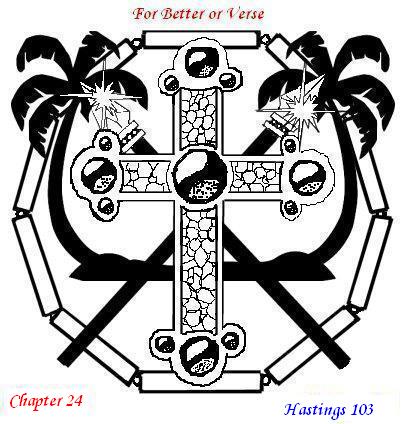
Patreon or PayPal Me keeps this site and its author alive. Thank you. |
Stories from the Verse
For Better or Verse
Chapter 24: Hastings 103
Table of Contents
Previous chapter: Chapter 23: Brown 63

It was a hungry and worried Lauren who walked back to her campsite near the cave. She needed to find food, but she had no means of knowing what she could, or should, eat. There were trees seemingly laden with strange fruits, any of which--or none of which--could be good, safe, and nutritious. Fruit was usually only good to eat when it was ripe, and she had no certain way of knowing when it would be ripe. Even if she could tell that, she still had the problem of knowing whether the trees were people, in the sense she had come to use that word, creatures of intelligence and moral will who deserved to be respected as human beings. Eating bird eggs seemed quite acceptable as long as the birds were just animals; had anyone dared to suggest eating the eggs of the parakeet people (she didn't know for certain whether they laid eggs, but it fit with what she knew) she would have had to object. Sane moral people did not kill unborn babies for any reason, not even for food, even if the babies were of a different intelligent creature. Eating the fruit from these trees could be tantamount to such an act, if the trees were such a creature.
As she settled into bed back in camp, it came to her to wonder how the trees got to be on the island at all. It was certainly possible that God had created this world, and this island, with the trees present from the beginning of time. He had not, as far as she could tell, chosen to use such a miraculous method of planting life in her own world. Although the method he had used was in a sense no less miraculous, it was in another sense explicable, something you could trace through a chain of effects and causes back toward a starting point. Trees were here because seeds were carried from other places.
That meant there was land elsewhere in the world. Having recognized this, it surprised her how much sense it made. After all, there were so few shore birds here that she had yet to actually see one close at hand, but for there to be a race of such creatures there would have to be at least hundreds, probably at least thousands. Were there so many here, she could not have helped seeing them by now. Thus they had to be living on the land elsewhere, with only some visiting here. This was an island, but there was land somewhere, at least in the form of other islands.
Seeds could only get here by traveling through the air or the water, she suspected. She gave a moment's thought to whether seeds of any sort could drop into magma in a volcano, travel beneath the earth's crust, and be spewed out by another volcano, but she could not see how any seed could survive such conditions, or how it would then be able to grow once cast out. No, air and water were the conduits. She supposed something like a coconut could float in the oceans for months, even years, then wash up on a beach, perhaps crashing on the rocks, and take root in a new world. Anything smaller than that would be eaten in transit. Something small, like dandelion or milkweed seeds, could float in the winds for hundreds of miles and so land on another island directly from the air. She had not noticed anything with such seeds, but it was possible. Still, there were plants here that were not so easily explained. There were fruits on these trees too heavy for the air and too fragile for the seas. There had to be some way that these were carried to this island from somewhere else.
The answer appeared to be the shore birds. It must have been that they ate these fruits, but failed to digest the seeds; that they then passed the seeds to fall on the ground, where they took root.
All this had another obstacle. There had to be dirt here for anything to find roots, but the island being volcanic would have been rock until after plants had died and turned to humus. It was reasonable to suppose that the surf had pounded rock to sand, and shore grasses had taken root to break this down further, and then died creating the needed topsoil over time. Her little haven might have been created for her overnight, she supposed, but there was something the more marvelous about the thought that millennia had been spent preparing a place for her. Of course, it would not have been for her alone; God did nothing that did not meet many needs. Her presence here had been considered.
If that was so, there was something here for her to eat, and a way for her to know what it was. God knew she needed food. He had already provided it. She just had to pay attention to what He was trying to tell her, and she would find it.
There is a behind-the-writings look at the thoughts, influences, and ideas of this chapter, along with ten other sequential chapters of this novel, in mark Joseph "young" web log entry #170: Versers Explore. Given a moment, this link should take you directly to the section relevant to this chapter. It may contain spoilers of upcoming chapters.
As to the old stories that have long been here:

